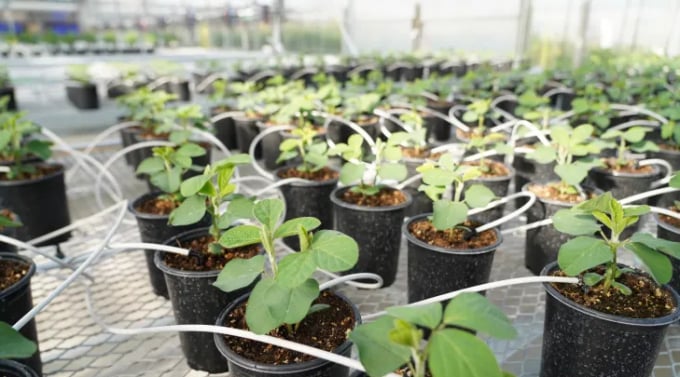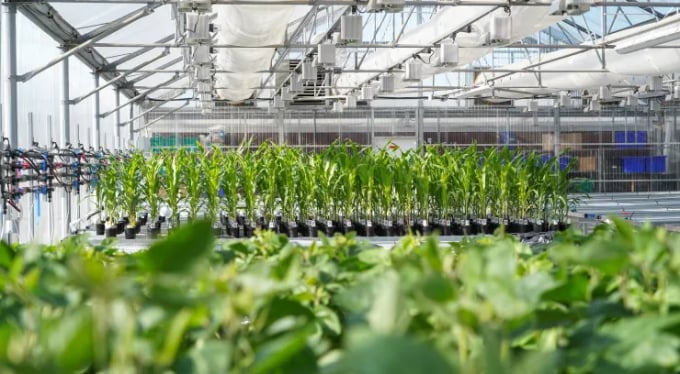November 27, 2025 | 23:42 GMT +7
November 27, 2025 | 23:42 GMT +7
Hotline: 0913.378.918
November 27, 2025 | 23:42 GMT +7
Hotline: 0913.378.918

Plants at the Joyn Bio greenhouse in Woodland, Calif. Photo: CNBC
It’s a thorny problem, but microbes may be able to help solve it.
That’s the thesis of Mike Miille and the team at Joyn Bio, a start-up launched in October 2017 as a joint partnership between the synthetic biology company Ginkgo Bioworks and the life science conglomerate Bayer’s investment arm, Leaps by Bayer.
Joyn Bio, headquartered in Boston, is working to engineer a microbe that would allow corn, wheat, and rice farmers to cut their use of nitrogen fertilizer by half while maintaining the same crop yield.
From the jump, Miille knew this was a “moonshot,” he told CNBC in a phone call in April. After three and a half years of work, Joyn Bio is testing prototypes, but is still three to four years off from having a product to sell to the market. Since its launch, Joyn Bio has raised $100 million from Bayer, Ginkgo and the investment house Viking Global to fund its operations.
If they can deliver, the potential impact is significant.
“If it works, it is very good. It is a big ‘if,’ but if it works, it’s nice,” said Josef Schmidhuber, an economist with the United Nation’s Food and Agricultural Organization. Schmidhuber admitted he knows nothing about Joyn Bio, so he could not vouch for the company, but the potential of the idea he recognizes as a gamechanger. “The idea is good. Brilliant. Absolutely. No doubt about it,” he told CNBC.
Stanford professor Anna M. Michalak, who is the director of the department of Global Ecology at the Carnegie Institution for Science, agreed.
“Developing approaches for decreasing fertilizer use would be a win-win-win for the farmer, the downstream environment, and the climate,” Michalak told CNBC. “Now, whether the particular technology proposed by this start-up actually does that, I don’t know.”
The big problems with nitrogen fertilizer
Fertilizers were responsible for about 1 billion tonnes of carbon dioxide equivalent greenhouse gases in 2019, according to the United Nations That’s approximately 2% of total annual global emissions that year. (2019 is the most up to date data available. Carbon dioxide equivalent, or CO2eq, is a standard unit for measuring the global warming potential of greenhouse gases.)
In addition, synthetic nitrogen fertilizer used on crops runs off into streams, lakes and oceans causing algae blooms and otherwise damaging the waterways.
It’s also gotten expensive, with prices up more than 133% since last year, according to a report published Monday by the Department of Agricultural Economics at Texas A&M University. Another primary fertilizer, made of phosphorous and potassium, rose by almost 93% in the same time frame.
Nitrogen fertilizer needs ammonia, which is created from hydrogen and nitrogen using an industrial process called Haber-Bosch. That process relies on natural gas, and gas prices have skyrocketed this year thanks in part to the Russian war in Ukraine That’s driven up fertilizer prices, Schmidhuber told CNBC.
The alternative is often worse: “In China, there are still coal-fired plants” being used to make synthetic fertilizer, Schmidhuber said. “That’s of course very dirty business, and the Chinese themselves are quite unhappy with it.”
A microbial replacement

Plants at the Joyn Bio greenhouse in Woodland, Calif. Photo: CNBC
Soybeans and other biologically similar legumes are capable of fixing nitrogen from the air without fertilizer. But cereal products like wheat, rice, and corn cannot do this, and so the goal is to engineer a microbe that can do it for them.
Joyn Bio aims to license the technology it’s building to a giant seed company like Bayer or Corteva, for example. The microbe will have to go on a seed and then the microbe will grow up with the corn plant, Miille said.
The techniques and tools that Joyn Bio is using have only become readily available in the past five to ten years, Miille told CNBC. So far, they’ve only been used to engineer a specific e. coli or yeast product. In this case, the microbe will actually have to work with a corn plant in the field, which is a big leap.
Miille has been working in the microbial agriculture space for a while now. He studied marine biology at Stanford and got a PhD in agricultural and environmental chemistry at the University of California, Davis. Before launching Joyn Bio, Mille was the CEO for 8 years at another microbial agriculture company, AgraQuest, which made biological pest management products called bio-pesiticides, and which Bayer bought for $425 million. Mille worked at Bayer for five years after his first start-ups acquisition and before creating Joyn Bio.
Joyn Bio’s prospects could be helped by the sudden price spike for traditional nitrogen fertilizer.
“Haber-Bosch is actually rather competitive, and cheap and well established,” Schmidhuber told CNBC. As long as there was excess shale gas in the United States and “cheap gas from Russia” in Europe before the Russian invasion of Ukraine, “the incentives to look beyond the Haber-Bosch were very minimal.”
It will take some time for Joyn Bio to get to market, in part because of the extensive regulatory requirements the company would have to meet.
“You have to do at least a couple years of field trials out there,” Mille said. And before then, Gingko intends to acquire Joyn Bio in a deal that is expected to close before the end of 2022. Financials of the deal are not being disclosed.
But Mille is confident that if they can get to market, the demand will make sense from an economic perspective for farmers.
“When we modeled this out in terms of profitability for the grower, we did it at a time when fertilizer was relatively inexpensive,” Mille said. “So even even under normal cost scenarios for the fertilizer, this is this is a financial benefit to the grower — there’s a big financial incentive to the grower to adopt this.”
“I’m worried about the ability of the industry to create fertilizer full stop — and forget about the rest,” Schmidhuber told CNBC. “The problem we see at the moment is that there is not enough food to go around. It could could actually get worse, because Europe, in its attempt to wean itself off from Russian gas, actually want to use gas for other purposes just to heat and not to produce fertilizer.”
(CNBC)

(VAN) A new study reveals how the simultaneous effects of ocean acidification, salinity and loss of oxygen are making the world more fragile.

(VAN) Hopes are growing that the creation of the first 3D turkey gut model could be a turning point in the battle against the virulent blackhead disease.

(VAN) Tyson, America’s biggest meat supplier, plans to shutter one of its largest beef processing plants as the industry continues to struggle with low cattle supplies and political pressure from Washington.

(VAN) New FAO study shows how digital solutions are empowering farmers and fishers to prevent losses and build resilient agrifood systems.

(VAN) Brazil's COP30 presidency pushed through a compromise climate deal on Saturday that would boost finance for poor nations coping with global warming but that omitted any mention of the fossil fuels driving it.

(VAN) Poultry farmers in the UK have been warned that they could face one of the worst winters yet for bird flu.

(VAN) Prices of main-crop paddy have risen sharply, with jasmine rice hitting 16,100 baht per tonne — the highest level in years.